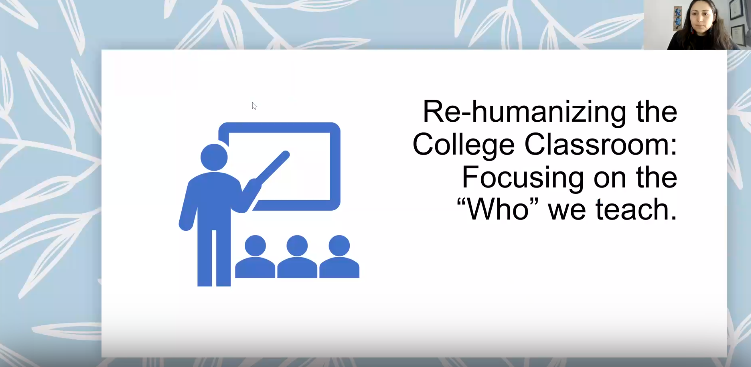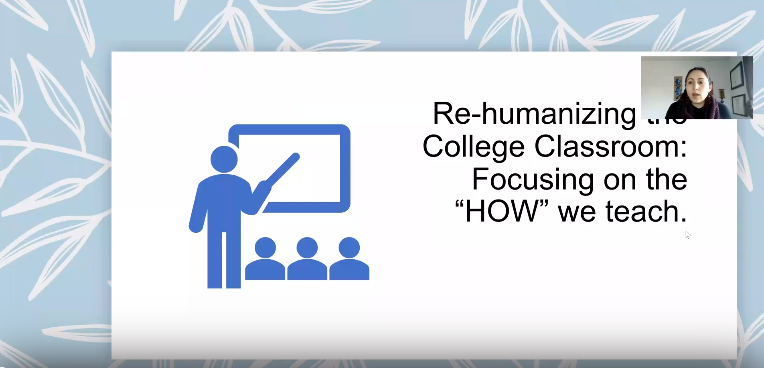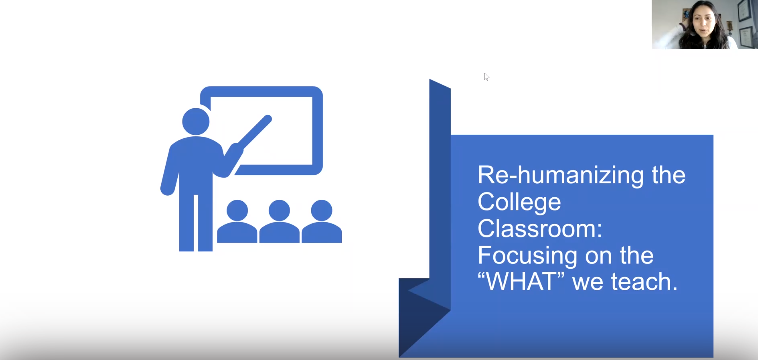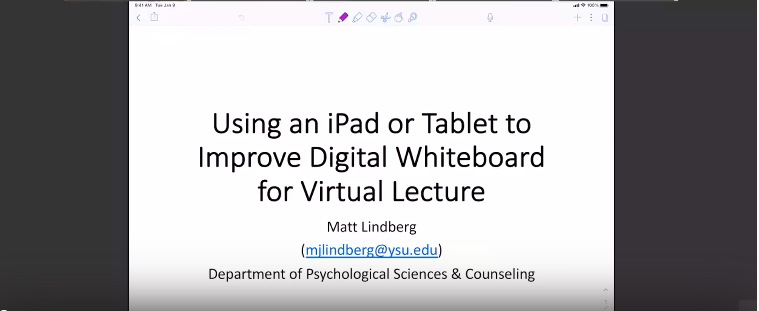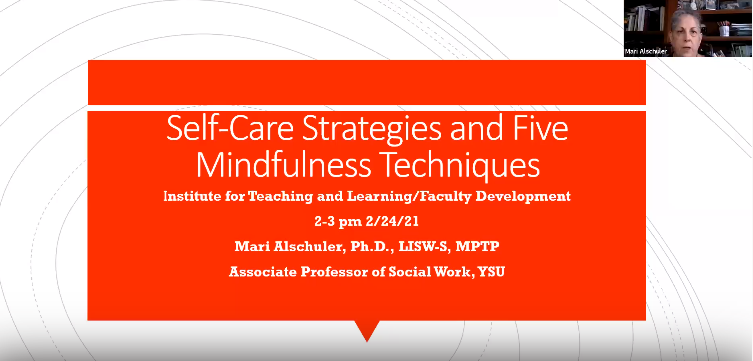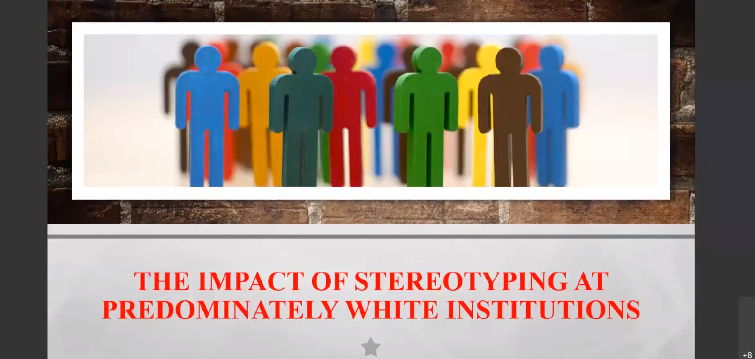-
-
Colleges
-
-
Student Experience Greek Life Housing & Dining Health & Recreation Our Campus Community Engagement Athletics
-
Past Workshops & Materials
Some workshop materials are available in a OneDrive folder, you will be asked to sign in with your YSU ID and password to access the materials.
2023-2024 Academic Year
Spring 2024
- Generative AI: A World of Opportunities for Teaching and Learning, February 23rd, 2024
Participants came to explore what AI has to offer in this practical, hands-on workshop. After a brief introduction to AI along with generative tools and how to prompt them, we examined how to use these tools to create engaging and effective teaching elements such as lessons, activities, assessments, and feedback. We will also experimented with how AI can benefit students in terms of improving their study skills to enhance learning. And finally, we considered how we might best prepare our students for the future of work. Led by Dr. Cynthia Alby.
- Rising to the Challenge of Diversifying the STEM Field, February 13th, 2024
Minoritized students are more likely to drop out of college. Minority students and women are driven out of STEM at every stage from middle school on. In this workshop, led by Dr. Alicia Prieto-Langarica, we explored the following questions: Why do we need to address these issues? What can we do in our classrooms, departments, and institutions to ensure that everyone has an opportunity to succeed? When faced with a challenging situation, what will you do to make our world a more equitable, just place?
- Fresh Start, January 4th, 2024
What's New in Campus Technology, 10-11AM
Participants learned about recent classroom technology upgrades and tools, and what's on the horizon tech-wise! Led by Rosalyn Donaldson (IT Training Services)New Generative AI Tools in Blackboard 11:10AM-12NOON
Blackboard has partnered with Microsoft to become the first LMS to leverage generative AI. The AI Design Assistant helps build your course and saves you time. Participants learned how they can use these features to help create learning modules, make rubrics, and create question banks. Led by Joe Alberti (CyberlearningAMA (Ask Me Anything) 1-2PM
Representatives from ITL, Cyberlearning, and IT Training Services were available for questions, concerns, and consultations.
Fall 2023
- Adapting Your Assessments for the Age of AI, November 16th, 2023
In the first part of the session, we considered why many conventional tests and assignment types fall short when students could be tempted to outsource the work to AI. We explored alternative assessment options such as experiential learning, multimedia assignments, collaborative projects, iterative feedback loops, and peer review.
Then, we moved on to an interactive mode where participants could collaborate with colleagues to redesign one of their current assessments. Cyberlearning and ITL facilitators were on hand to help them adapt their in-person or online assessment to better evaluate authentic student learning in an age of easily accessible AI chatbots. Participants left with fresh ideas for creating thoughtful, engaging assessments suitable for students, not just for chatbots.
2022-2023 Academic Year
Spring 2023
- Using Active Learning in STEM Classes (Sustainably) (A special session for mathematics and statistics faculty), April 3rd, 2023
An overwhelming amount of research and anecdotal evidence points to active learning as the best setup for students to learn, especially in the STEM subjects. But does it work in a math or statistics class? And can you do it without committing enormous amounts of time or energy to make it work? In this three-part working meeting, we seen examples of “small” active learning activities for use in mathematics courses, then participants will had a chance to make their own, and then we challenged ourselves with a “lightning round” of active learning task design on some randomly selected math and statistics topics. Led by Robert Talbert.
Session Recording Password: Penguins*1
- Active Learning: Three Good Reasons to Use It and Three Good Reasons Not to, April 3rd, 2023
Active learning -- defined as "instructional activities involving students in doing things and thinking about what they are doing" (Bonwell and Eison, 1991) -- has permeated higher education for 30 years and today stands on the cusp of becoming a normative experience for students and instructors. But why should an instructor dive into active learning? In this talk, we outlined what active learning is and what it isn't, and focused on research that can give us confidence in using active learning in the classroom. We also looked at some common missteps that can happen when we use active learning and how to avoid them. Led by Robert Talbert.
Session Recording Password: Penguins*1
- Noel Levitz Lunch & Learn Series
Participants joined staff in the Institute for Teaching and Learning to learn more about how YSU students responded to the 2022 Noel Levitz survey, and to discuss opportunities for action based on the data. These topic-based interactive sessions were held both virtually and in person.
- Experiences Outside the Classroom: Wednesday, March 22, 2023, 12-1PM
- Advising and Goal Setting: Wednesday, March 29, 2023, 12-1PM
- Admissions, Registration, and Financial Support: Wednesday, April 5, 2023, 12-1PM
- Experiences in the Classroom: Wednesday, April 12, 2023, 12-1PM
- Classroom Connections Using the Intentional Relationship Framework, March 20th, 2023
This workshop focused on developing student relationships. This session provided tools that allow you to build Close Connections through which young people discover who they are, cultivate abilities to shape their own lives, and learn how to engage with and contribute to the world around them. Positive relationships with students can lead to increased motivation and improve class attendance and performance. Led by Mike Beverly from the Resch Academic Success Center.
- Working with International and Multilingual Students Series
International and Multilingual Students at YSU: Myths and Realities, February 14th, 2023
This workshop provided an overview of these unique and growing student populations at YSU: Who are international and multilingual students? Where are they from? What brought them to Youngstown? How much English do they know? Simple, yet culturally-appropriate, strategies for learning more about students in your own classes were shared.
"I Teach___, not English!": Teaching International and Multilingual Students, March 14th, 2023
As the number of international and multilingual students grows at YSU, course instructors may encounter unfamiliar teaching challenges. This workshop provided strategies for making your lessons and lectures accessible to students from all language backgrounds.
Culture and Communication with International and Multilingual Students, April 11th, 2023
Ever had international or multilingual students nod like they understand you -- then turn in something that shows they didn't? (Ever have that happen repeatedly?) These and other communication challenges aren’t solely (or mainly!) due to language differences – they're likely also due to cultural differences. This workshop addressed common cultural misunderstandings that arise when teaching international and multilingual students, ways to prevent such misunderstandings, and strategies for reducing stress when teaching and working across cultures and languages.
- Teaching in the Chat GPT Age, February 2nd, 2023
A virtual workshop focused on learning more about the new technology, Chat GPT, and how to address it in the classroom. Joe Palardy (Economics), Mark Vopat (Philosophy), and Hillary Fuhrman (ITL) taught staff and faculty about the new tool, ethical issues and considerations, and some practical strategies to implement in your courses. Time was reserved for questions, comments, and discussion. Use your YSU ID and passsword to access slides and watch recording (note the password for the recording link is Penguins 1).
- Fresh Start Keynote: Fantastic Universal Design for Learning (UDL) with Thomas Tobin, January 13th, 2023
This keynote workshop demonstrated the “step zero” that makes all of our diversity, equity, and inclusion efforts possible: access. Through the universal design for learning (UDL) framework, faculty and staff learned concrete steps that help to lower barriers, anxiety, and stress—for their students and for them. When we focus our learning interactions on how our students get access to materials, each other, instructors, support services, and the community, we strengthen their sense of belonging as learners. This workshop advised participants on how to take some work off your plate—as you engage with YSU students.
Led by UDL expert and University of Wisconsin-Madison faculty developer Thomas Tobin. Thomas J. Tobin, PhD, MSLS, PMP, MOT, CPACC is a founding member of the Center for Teaching, Learning, & Mentoring (CTLM) at the University of Wisconsin-Madison, as well as an internationally recognized scholar, author, and speaker on technology-mediated education. His books include:
- Evaluating Online Teaching: Implementing Best Practices (2015)
- The Copyright Ninja (2017)
- Reach Everyone, Teach Everyone: Universal Design for Learning in Higher Education (2018)
- Going Alt-Ac: A Guide to Alternative Academic Careers (2020)
- UDL for FET Practitioners: Guidance for Implementing Universal Design for Learning in Irish Further Education and Training (2021)
- Fresh Start Virtual: What's New in Classroom Technology, January 6th, 2023
A workshop focused on recent classroom technology upgrades and tools. Led by Rosalyn Donaldson (IT Training Services).
- Fresh Start Virtual: Supporting Students (and yourself), January 6th, 2023
This workshop focused on recognizing faculty expectations and challenges working with students; how to be good educators and have boundaries; how to help students see their roles and responsibilities as learners in the classroom; and strategies for recognizing and responding to areas of teaching frustration/student concerns. Led by Kristin Bruns and Emily McMillan (Counseling).
FALL 2022
- Fresh Start: Active Learning, December 20th, 2022
This one-day workshop facilitated by Dr. Alicia Prieto taught faculty and staff about key considerations in incorporating active learning, experiencing active learning techniques through mini-class experiences from your colleagues, and spending time developing changes to one or more of your spring classes. Active techniques experiences included:
- Co-creating a syllabus with your students (Alicia Prieto, Mathematics)
- Using immediate feedback and quiz corrections (Snow Balaz, Physics)
- Concept mapping in large classes (Sharon Stringer, Psychology)
- Video feedback and other technology for active learning (Michelle Nelson, Graphic Design)
- Co-creating rubrics with students (Hillary Fuhrman, ITL)
- Introduction to the TEACH Principles: Humane, November 17th, 2022
Every other Thursday morning ITL hosted a discussion hour with coffee and pastries while we provided a short introduction and teaching tip (~15 minutes) on one of the TEACH Principles. Attendees had the rest of the hour to share their ideas, ask questions, or discuss teaching topics.
- Introduction to the TEACH Principles: Communicative, November 2nd, 2022
Every other Thursday morning ITL hosted a discussion hour with coffee and pastries while we provided a short introduction and teaching tip (~15 minutes) on one of the TEACH Principles. Attendees had the rest of the hour to share their ideas, ask questions, or discuss teaching topics.
- Introduction to the TEACH Principles: Aspirational, October 20th, 2022
Every other Thursday morning ITL hosted a discussion hour with coffee and pastries while we provided a short introduction and teaching tip (~15 minutes) on one of the TEACH Principles. Attendees had the rest of the hour to share their ideas, ask questions, or discuss teaching topics.
- Introduction to the TEACH Principles: Evidence-Based, October 6th, 2022
Every other Thursday morning ITL hosted a discussion hour with coffee and pastries while we provided a short introduction and teaching tip (~15 minutes) on one of the TEACH Principles. Attendees had the rest of the hour to share their ideas, ask questions, or discuss teaching topics.
- Introduction to the TEACH Principles: Transparency, September 21st, 2022
Every other Thursday morning ITL hosted a discussion hour with coffee and pastries while we provided a short introduction and teaching tip (~15 minutes) on one of the TEACH Principles. Attendees had the rest of the hour to share their ideas, ask questions, or discuss teaching topics.
2021-2022 Academic Year
Spring 2022
- Creating Creative Capstones: A Hands-On Workshop!, April 11th, 2022
11:00am-12:00pm
ITL partnered with the YSU Honor's College Academic Program Director and Distinguished Mathematics Professor Alicia Prieto Langarica to think outside the capstone paper.
This one-hour workshop discussed ideas and different formats to deliver a capstone; it does not have to be a paper! We also talked about what makes a good capstone project challenging and engaging, while discussing ways to support your students (and yourself!) through this process.
- Copyright Guidelines for Showing Films, April 5th, 2022
2:30-3:30pm, Virtual
In this session, ITL and Maag Library Co-Director Christine Adams discussed film copyright and film resources available on campus!
When showing films on campus or remotely, the rights of the copyright holder must be considered. The Federal Copyright Act governs how copyrighted materials may be utilized publicly. There are strict legal requirements for showing films in different educational situations, whether it be in the classroom, in an online course, or for a public performance. The presentation displayed the rules for each of these situations and the concepts and issues involved, including:
- Fair use exception for educational purposes (in-person teaching)
- Streaming video content in online courses (TEACH Act)
- How copyrighted materials may be utilized for public events
- Streaming resources available through Maag Library
- Public domain films
- Resources for free and legal streaming video
- A Pedagogy of Hope in the Classroom by Kevin Gannon
While it may have seemed counterintuitive to talk about a pedagogy of hope in the fraught times we experienced, hope was the very foundation of student success. In this sense, hope was the product of agency and pathways. For our students to feel genuine hope that they will be successful in their time with us, they have to believe that success is in their power to achieve (agency), but also be able to discern what routes they need to take to reach it (pathways). This session asked participants to imagine their own approaches to teaching and learning within this larger framework of creating hope for students. We looked at some of the most significant barriers to learning—such as not feeling a sense of belonging, or “mismatched” approaches to the learning climate—and identified specific strategies and practices to mitigate them. Finally, we considered how embedding our pedagogy in an ethic of hope could help us find solidarity and community with our colleagues and sustain us in doing the hard work of teaching.
- Listening is Not Enough: Sustaining a Culture of Belonging by Kevin Gannon
When we say we listen to our students, they often wonder if we really hear them. This session explored the research on students’ sense of belonging to suggest ways in which we all can create a campus environment that welcomes, supports, and retains students. Using an equity and justice lens, we examined strategies that campus units can implement to create a culture of belonging in which all of our students have the opportunities and resources to be successful.
- NSSE 2021 Results: Lunch and Learn
- March 16, 12-1PM, Hybrid via Webex & Coffelt Hall B102: Academic Challenge & Academic Advising (Download Slides & Handouts)
- March 30, 12-1PM, Hybrid via Webex & Coffelt Hall B102: Learning w/Peers & Inclusiveness/Engagement with Diversity (Download Slides & Handouts)
- April 13, 12-1PM, Hybrid via Webex & Kilcawley Center 2068: Experiences w/Faculty & High Impact Practices
- April 27, 12-1PM, Hybrid via Webex & Kilcawley Center 2068: Campus Environment
In this session, ITL staff discussed the results from the National Survey of Student Engagement (NSSE), offered to all first-year and senior students in spring 2021.
The NSSE page on the ITL website has an on-demand overview webinar as well as summary data. We took a closer look at the Engagement Indicators through our Lunch and Learn: Data Conversations Series. Participants had the opportunity to review data points of interests, discuss implications, and share their perspectives in developing institutional recommendations. The workshops were offered in a hybrid format, and lunch was provided to those who attended in person.
- Putting Butts in Seats-- Encouraging Students to Take Your Classes, March 14, 2022
5:30pm-7:00pm
Presented by ITL Faculty Fellow, Susan Clutter, this seminar demonstrated the pros and cons of using each instructor management style in the classroom to attract as many different types of students as possible. We also discussed tips to convert increased student success/satisfaction into increased registration in future semesters. Learning outcomes included -- understanding the four management styles of a subject matter expert - tell, sell, coach, delegate; reviewing the categories of students in a typical YSU classroom - international, non-traditional, commuter, students with disabilities, etc.; discussion on the application of each management style to each type of student for increased student success; strategizing methods to increase the commercial success of a course.
- Making Blackboard Work for You/Blackboard Q&A, February 28th, 2022
5:30pm-7:00pm
Presented by ITL Faculty Fellow, Susan Clutter with the Department of Cyberlearning, this session demonstrated Blackboard tips to save time and tools that can help organize your course more efficiently. There was a short tips presentation with remaining time being used to ask Blackboard questions.
- How to Grade Less - Student Assessment Alternatives, February 16th, 2022
5:30pm-7:00pm
Presented by ITL Faculty Fellow, Susan Clutter, this seminar summarized the traditional assessment methods, such as tests and grade homework assignments, with more conventional assessment techniques that require less instructor grading. Learning outcomes included - listing reasons why assessment is important; defining summative versus formative assessment; listing examples of individual, peer, and self-assessment, including new approaches to testing (concept mapping, rubrics, etc.); summarizing recent research of higher education that assess the assessment.
- Getting Students to Listen--Teaching Generation Z, January 31st, 2022
5:30pm-7:00pm
Presented by ITL Faculty Fellow, Susan Clutter, this seminar focused on the different teaching styles that can be utilized with the current generation of students. Learning Outcomes included: Categorizing boomer, gen X, Y, and Z learners, including age ranges and common pedagogy used during that time period; Understanding the five types of pedagogy - Constructivist, Collaborative, Integrative, Reflective and Inquiry-Based Learning; And appropriating pedagogy types with the generation of learners in your courses.
- What's New in Classroom Technology, January 6th, 2022
3:00pm-4:00pm
A workshop focused on recent classroom technology upgrades, and how to use the new campus-wide student response system, Slido.
- Emotional Labor, January 6th, 2022
1:45pm- 2:45pm
Staying resilient, Working Well: This practical workshop by the author of The Peak Performing Professor offered models for understanding the origin & function of emotions & a set of strategies to structure emotional labor & how to increase your own resilience & resistance to burnout.
- Communication Strategies with Transgender/Non-Binary Students, January 6th, 2022
12:30pm-1:30pm
In order to educate, inform, & dispel myths, this presentation covered gender identity & internationality, the importance of language, and steps to ensure a safe and welcoming classroom & campus.
- EDU-Nerds Assesmble with Jessamyn Neuhaus, January 6th, 2022
10:30am-11:45am
Fighting Big Teaching Myths in Troubled Times: This presentation by the author of Geeky Pedagogy was a call to action for all of us edu-nerds who love our scholarly subjects & want to continue to facilitate student learning during troubled times.
fall 2021
- Curricular Complexity for Curricular Efficiency
More information coming soon
- Designing a Course with Contention in Mind with Faculty Fellow Monica Merrill, December 2nd, 2021
3:00-4:00PM
In this workshop, we reviewed the four typical reactions that students have to difficult/contentious topics (paralysis, paralysis by proxy, rage, and resistance). After we identified and explained the four reactions, we discussed what examples of this participants have seen in their classroom and what ‘triggers’ they see in the course structure. Lastly, we discussed ways we can proactively manage these reactions by how we structure our courses.
Participants were asked to choose one course they teach and brainstorm ways that they can be proactive about these reactions and what they can do to lessen them.
- Reviving Your Intellectual Life, November 3rd, 2021
3:00-4:00PM
I don't know about you, but after a tough year, we could sure use a jump-start. This workshop offered a variety of resources and opportunities to re-engage with your research agenda. View the material to learn more about grant opportunities, new research databases, podcast and article clubs, and writing circles!
- Classroom Management in Divided Times with Faculty Fellow Monica Merrill, October 26th, 2021
1:00pm-2:00pm
In this workshop, we discussed the four typical reactions that students have to difficult/contentious topics (paralysis, paralysis by proxy, rage, and resistance). We explained each and participants were asked to identify examples that they have seen in their classes. Lastly, we went over best practices for classroom management strategies and how we can potentially apply them to our courses.
Participants were asked to choose a class they are teaching and to identify possible polarizing topics and best practices. They then worked together to pair some of the classroom management strategies we had gone over to each of their topics.
- Managing Classroom Conversations Panel Series: De-Escalading Tension in the Classroom, October 19th, 2021
3:00pm-4:00pm
In this ITL panel discussion series, we explored how faculty in different disciplines approach, address, and manage civil conversations around challenging topics.
This panel focused on how to help students who may be frustrated, angry, or upset, both in the classroom or in individual interactions. The focus was on creating a positive classroom community.
- ITL Lunch & Learn: Grading for Equity, October 14th, 2021
12:00pm-1:00pm
In this workshop, ITL staff discussed strategies for equitable assignment and assessment design. The workshop focused on 3 areas - maintaining high expectations, a willingness to challenge the way “we’ve always done it,” and increasing transparency by involving students. We shared ready to go examples that we’ve tested in our courses and could be used in yours!
- Telling Fact from Fiction - Information Literacy with Students with Faculty Fellow Monica Merrill, October 7th, 2021
3:00pm-4:00pm
In this workshop we reviewed strategies to help students differentiate fact from fiction. We went over activities that students can do to help them learn this skill. We explored ways to incorporate these lessons into existing classroom activities and assignments. Lastly, we discussed how we can emphasize the importance of learning how to tell fact from fiction to students.
Participants were asked to pick an existing assignment in their class and think about how they could add differentiating fact from fiction as a learning outcome for that assignment.
- Managing Classroom Conversations Panel Series, September 30th, 2021
3:00pm-4:00pm
In this ITL panel discussion series, we explored how faculty in different disciplines approach, address, and manage civil conversations around challenging topics. This panel focused on how faculty are maintaining civil conversations, supporting fearful students, and having productive conversations.
Panelists include:
Nicolette Powe, Public Health
Alan Tomhave, Philosophy
Nicole Kent-Strollo, Dean of Students
2020-2021 Academic Year
spring 2021
- Flower Darby: Effective Teaching Strategies for Teaching Online & Hybrid During COVID- 19
- Small Teaching Online: Practical Strategies for Teaching During COVID-19 (9a- 10a)
- Fostering Connections to Help Online Students Engage and Learn (10:10a- 10:35a)
- Teaching Inclusive and Equitable Online and Remote Courses (11a-11:25a)
- Assessments That Promote Academic Integrity in Virtual Environments (11:35a- 12p)
- Part-Time Faculty Session: Setting Yourself Up for Success -- How to Have an Organized & Efficient Semester
- Solid Start, Solid Middle, Solid Finish: Tips & Strategies to Help Your Online Learners (and you) Successfully Manage the Virtual Learning Environment
- Student Panel: What I Wish My Professor Knew
- Burnout Resilience in Challenging Times
- Re-Humanizing the College Classroom: Focusing on the "Who" we Teach
Thursday, February 18th, 3-4P Facilitator: Alicia Prieto. In this workshop we discussed who our students are and how to center their humanity in our classrooms. We spoke about the so-called “classic” modes of instruction and who they benefit and who they leave behind. We explored how belonging affects learning and how to create spaces conductive to the discovery and creation of knowledge in our classrooms.
Click the recording below to view.
Image - Re-Humanizing the College Classroom: Focusing on the "How" we Teach
Thursday, March 4th, 3-4P Facilitator: Alicia Prieto. In this workshop we discussed particular ways to bring humanity into the classroom. We talked about ways to build community, different examples of active learning, and ways in which we can facilitate students ownership of their own learning
Click the recording below to view.
Image - Re-Humanizing the College Classroom: Focusing on the "What" we Teach
Thursday, March 18th, 3-4P Facilitator: Alicia Prieto. In this workshop we re-evaluated what we are teaching by focusing on what skills and knowledge we are expecting college graduates to have. We discussed ways in which we can design curriculum around who our students are and different ways of assessing students’ growth.
Click the recording below to view.
Image
- Efficient Outline Course Design
Tuesday, January 26th, 4-5P Facilitator: Mark Vopat. This workshop outlined the steps necessary to create an effective online course. It was geared toward those that have little to no experience with creating online courses. Topics to be discussed include:
No Recording Available
1. Backward Course Design
2. General course/module structure
3. Media
4. Course preparation workflows
5. Instructor presence
6. Facilitation - Using an IPad or Tablet to Improve Digital Whiteboards for Virtual Lecture
Thursday, February 4th, 3-5P Facilitator: Matt Lindberg. This workshop discussed you how to incorporate the writing ability of an iPad or tablet into your lectures. The workshop was presented using an iPad and Mac, but options and alternatives were discussed.
Click the recording below to view.
Image
- Mindfulness Techniques for Self-Care
Wednesday, February 24th, 2-3P Facilitator: Mari Alschuler, Ph.D., LISW-S. In this workshop, participants discussed five basic mindfulness techniques they can use at any time for stress management. Participants also explored self-care strategies by completing an exercise and then discussed how they intend to implement their self-care plan.
Click the recording below to view.
Image
- An Introduction to Open Educational Resources
Wednesday, March 10th, 4-5P Facilitator: Shelley Blundell. This workshop provided participants with a practical overview of Open Educational Resources (OERs) and their use in higher education, particularly in courses with high-cost textbooks, which YSU students frequently do not purchase because of these high costs. Examples of the workshop instructor’s own OER usage, their overall benefits to students, and resources for finding high-quality OERs participants were shared with attendees.
No Recording Available - The Impact of Sterotyping at Predominately White Institutions
- Tired of Virtual Meetings?
Anybody else ready to be able to meet again in person? I sure am! Unfortunately, we're looking at another semester of having to connect and engage remotely. Watch this pre-recorded session that runs through a whole bunch of ideas that will hopefully make your meetings a little less boring. Nothing replaces the real thing, but I hope you find something that is useful to your student organization.
- Creating an Asynchronous Course
More information coming soon
- SGA: Assessing Diversity, Equity & Inclusion
More information coming soon
- Pandemic Grading -- New Ways of Grading for COVID-19 and beyond
"Pandemic Grading—New ways of grading for COVID-19 and beyond" facilitated by Dr. Marsha Huber, Professor of Accounting
This workshop will introduce you to two new grading methods – (1) competency-based grading and (2) specifications grading. Like you, the pandemic forced me to rethink how I was grading student work. I adopted “competency-based” grading where grades are based on whether students meet competencies instead of focusing on averaging points. Also, I intuitively began grading my graduate students' work differently than in prior semesters, which I have since learned is called “specifications grading.” In the workshop, I will share what I did and how students reacted to it, allowing time for you to workshop your classes too.
- Teaching Distracted Minds: Old Challenges, New Contexts facilitated by James Lang, Professor of English and the Director of the D'Amour Center for Teaching Excellence at Assumption University
Faculty concerns about distracted students have intensified as we have all shifted online, but our real focus should be on how we help students achieve attention. This session draws upon scholarship from history, neuroscience, and education in order to argue that distractions are endemic to the human condition, and can’t be walled out of the physical classroom or online course. Instead, we should focus on creating educational experiences that cultivate and sustain attention. Participants will learn about a variety of potential pathways to developing such experiences for their students.
About James Lang:
James M. Lang is a Professor of English and the Director of the D’Amour Center for Teaching Excellence at Assumption University in Worcester, MA. He is the author of six books, the most recent of which are Distracted: Why Students Can’t Focus and What You Can Do About It (Basic Books, 2020), Small Teaching: Everyday Lessons from the Science of Learning (Jossey-Bass, 2016) and Cheating Lessons: Learning from Academic Dishonesty (Harvard University Press, 2013), and On Course: A Week-by-Week Guide to Your First Semester of College Teaching (Harvard UP, 2008).
Jim writes a monthly column on teaching and learning for The Chronicle of Higher Education; his work has been appearing in the Chronicle since 1999. His book reviews and public scholarship on higher education have appeared in a wide variety of newspapers and magazines, including the Boston Globe, Chicago Tribune, and Time. He edits a series of books on teaching and learning in higher education for West Virginia University Press. Learn more at jamesmlang.com
Fall 2020
- You're on Mute: How to Make Your Digital Meetings Fun & Meaningful
Learn about some low-effort strategies and free tools that you can include in your virtual student organization meetings to increase interaction, keep members engaged, and give everyone a voice!
- Managerial Communication
More information coming soon
- Corrective Action
More information coming soon
- Building Your Home- Based Streaming Classroom
"Building Your Home-Based Streaming Classroom" facilitated by Dr. Mark Vopat, ITL Faculty Fellow
The global pandemic has necessitated the move to online live streaming of courses. While not an ideal medium for teaching, some of the common annoyances that both instructors and students experience can be mitigated by understanding the basics of audio and video streaming. The goal of this workshop is to provide the information necessary to get the technology aspects of teaching online out of the way, so instructors can focus on the presentation of their course content. Some of the topics that will be discussed include: internet setup and speed needs, microphones and audio interfaces, and video cameras and lighting. By the end of the workshop, participants should have the tools necessary to set up a home streaming solution that works best for their needs.
- Student Learning Data during COVID
This webinar discusses some of the data collections focused on student learning during COVID, including the spring student survey and the fall short NSSE Pulse survey. Data can be used to inform program improvement work.
- Virtual Connections Webinar (Impact Solutions)
More information coming soon
- Safe Return to the Classroom with COVID
Members of the "Calendar Scenarios for a Safe YSU" Taskforce, will share key information and prepare you to return to your classrooms this fall. Provost Smith will also lead a Q&A session after the presentation. Topics include the "For Pete's Sake" safety campaign information, syllabus statements, attendance tracking, and face-covering policies. Download supplemental slides on collecting attendance using the YSU App for contract tracing.
- Tips & Tools to Working Digitally
This training is a survey workshop of multiple available tools and platforms and best practices for successfully working remotely or additional ways to use these tools while working on campus.
Summer 2020
- Getting Started
This workshop is a survey of the best practices and university supported tools that will enable to you set the expectations for your course, ensure your course is equitable, communicate with your students, and provide information on resources for students that need assistance with using class technologies.
- Instructional Basics
This survey workshop moves beyond Getting Started and provides best practices and tools, depending on the modality, suggests ways you can distribute course material, assess student learning, maintain academic integrity and host live lectures.
- Instructional Advanced
This workshop will provide ideas, resources, and ways for students to demonstrate a skill, give an online presentation, encourage their learning and facilitate a lab remotely.
- Engaging Students
As you continue to build your course it is important that you provide ways for students to engage in the learning process. This workshop will provide ideas and ways to personalize your course, help your students engage with the content and help them participate in a class discussion. The workshop will also provide tools and best practices for hosting and managing a simultaneous face-to-face and online audience.
- Supporting Success
It is important that students stay involved in the course. This workshop will provide you with various ways to check student understanding of content, provide them quality feedback, ideas to help keep them motivated and involved in the course.
- Connecting Students
Retention studies show that one of the major components of retaining students is that they feel supported, connected to campus and connected to each other. This workshop will provide information how students can work on group projects together successfully, ways they can connect with each other and you and the campus support resources available to them in the areas of academic support, physical and mental health support, and how to assist a student in distress.
- Blended Course Design
Participants will learn a backward design approach and instructional strategies that will help faculty planning new fall modalities, or as a backup plan for traditional courses.
2019-2020 Academic Year
Spring 2020
- Get Ready: Blackboard Ultra is Here!
More information coming soon
- Teaching Toward Student Success
More information coming soon
- Things You Didn't Know You Could Do in Office 365 Education
More information coming soon
- NL Data Conversation: Advising, Instruction, Academic Services
More information coming soon
- NL Data Conversation: Admissions/Recruitment, Financial Aid & Registration
More information coming soon
- Emergency Management in Study Abroad Trips
The Emergency Management in Study Abroad Trips is meant to prepare faculty for their upcoming study abroad trips. This workshop is in partnership with the International Programs Office.
- NL Data Conversation: Student Centeredness, Campus Climate, Climate Life, Safety/Security
More information coming soon
- Supporting Student Mental Health Remotely
Find out how faculty and staff can support students' mental health needs during online instruction. You will learn the value of asking, listening, acknowledging, supporting, challenging, and connecting. We will discuss your role and scope of care as an educator and learn about additional resources to you and your students. Webinar delivered by Dr. Ann Jaronski, Director of YSU Student Counseling Services.
- Academic Student Support for Remote Learning
We know that some of your students may be struggling academically right now, and that you want to help them. Becky Varian, Center for Student Progress Director, will present ways we can support students, and what resources are available to help.
Online Course Reassessment Student Handout
Final 4 Weeks Planning Calendar Student Handout
Top 10 Online Learning Strategies - Student Handout
- Online Speeches? Yes, It Can Work!
Online speeches work best with careful planning and preparation. In this hour-long webinar, Cary Wecht and Dorian Mermer (Department of Communication) walk you through the steps to set up your assignment and assessments to maximize speech quality.
fall 2019
- Community Engaged Pedagogies
More information coming soon
- Establishing the Learning Center as the Nucleus of a Learner Centered Institution
More information coming soon
- Get Students to Focus on Learning Instead of Grades: Metacognition is Key!
More information coming soon
- Teach Students How to Learn 2.0
More information coming soon
- Using Appreciative Advising to Help Students Excel
More information coming soon
- Tenure and Promotion
More information coming soon
- Inclusion and Interaction Webinar
More information coming soon
- Persons of Concern
More information coming soon
- Getting Non-Science Majors Excited about Science!
More information coming soon
- Flipping Classrooms via Active Learning Techniques
More information coming soon

